The following is a response to a piece called ‘The never-ending death of analytic philosophy’, by Dr Christoph Schuringa.
Despite the mention of “death” in his title, Schuringa goes on to tell us that
“analytic philosophy somehow seems to continue to be with us as the dominant force in academic philosophy”.
Christoph Schuringa has written a lot on Karl Marx. So perhaps Marx’s own well-known words against philosophy may well sum up Schuringa’s own position on analytic philosophy. Indeed there’s even a reference to “Marx on the ‘supersession’ of philosophy” on Schuringa’s academic webpage (see screenshot below).
In his Theses on Feuerbach, Marx wrote:
“The philosophers have only interpreted the world in various ways; the point, however, is to change it.”
So is Schuringa attempting his very own supersession of analytic philosophy?
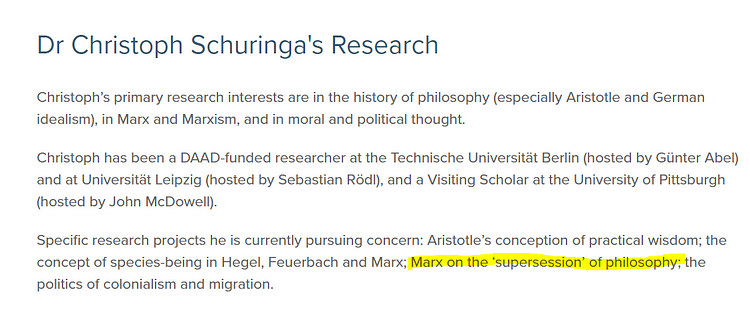
Well, it’s certainly the case that Schuringa wants to change analytic philosophy — radically! Whether Schuringa also believes that philosophy’s main — or even only! — goal is to change the world will hopefully become clear in the following.
As for biographical details, let Christoph Schuringa speak (or write) for himself:
“I am Assistant Professor in Philosophy at the New College of the Humanities (part of Northeastern University), and Editor of the Hegel Bulletin. My chief interests are in the history of philosophy (especially Kant, Hegel, and Marx), in the traditions of Marxism and critical theory, and in social and political thought more widely. Specific current research projects concern Marx’s critique of Hegel, the concept of Gattungswesen, and ‘tragic’ conceptions of philosophy. My large-scale current project is a monograph I am writing on Marx… I was recently in the Philosopher’s Zone (ABC Radio National, Australia), talking about the history, and prospects, of analytic philosophy (broadcast 20th June 2021).”
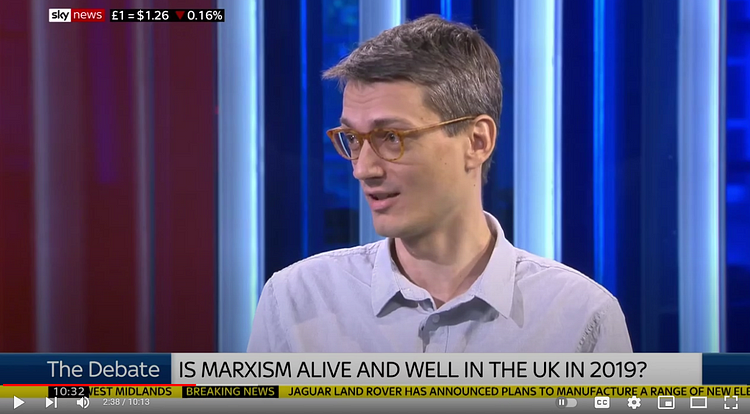
As you can see, there’s not much analytic philosophy above — save for the final bit about “talking about the history, and prospects, of analytic philosophy”. So Schuringa is essentially “talking about” analytic philosophy from the outside. (Although Schuringa might well have been “trained” in analytic philosophy.)
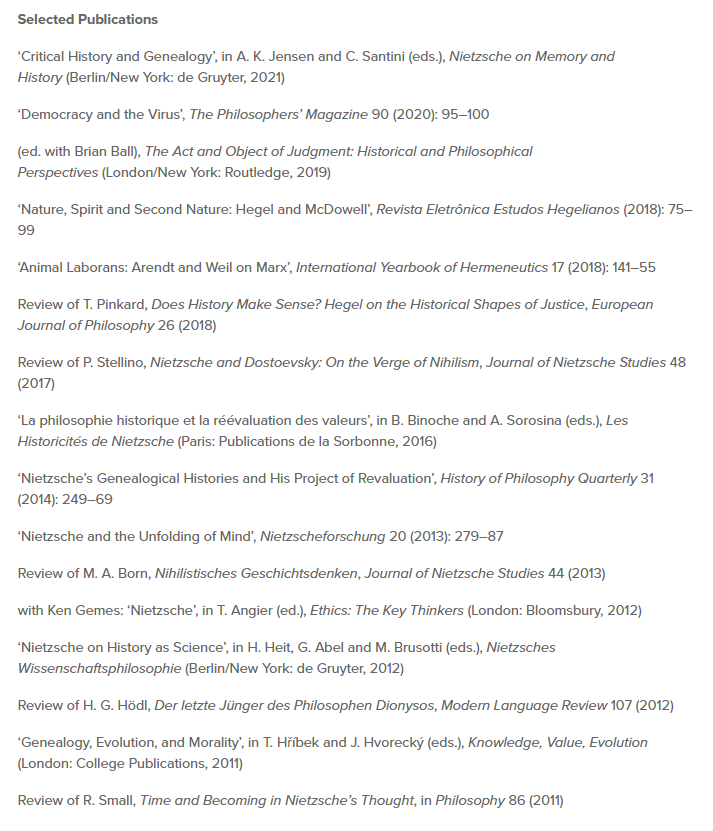
It can also be seen that in Schuringa’s ‘Selected Publications’ (screenshot above) there’s no analytic philosophy there either. (The one exception is The Act and Object of Judgment: Historical and Philosophical Perspectives — a book Schuringa edited but didn’t contribute to.)
So Schuringa has basically declared war on analytic philosophy from the outside. This is not, then, a civil war initiated by someone who finally came to see the limitations of — and problems with - analytic philosophy after years of writing and teaching it (say, as Richard Rorty did).
Everything is Political: Therefore Analytic Philosophy is (“Unwittingly”) Political
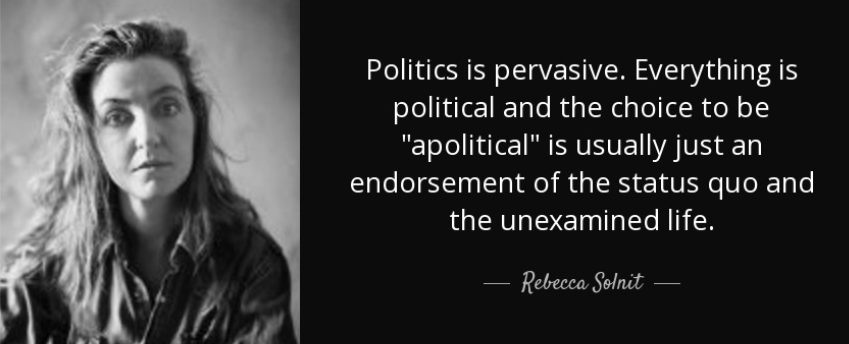
To Dr Christoph Schuringa, it’s literally all about politics.
As Schuringa says of a previous period of analytic philosophy:
“[T]he philosophical work [of analytic philosophers] remained untainted by politics.”
That statement statement basically contradicts other words by Schuringa in that to be “untainted by politics” (or to be “apolitical”) is actually to be political (see later). That said, to be untainted by politics is still a serious problem for Schuringa.
So why did Schuringa feel the need to talk about “the death of analytic philosophy” in the first place?
It can easily be shown that Schuringa desires (or wants) the death of analytic philosophy.
Of course Schuringa will deny that because it’s simply too extreme to put it in that absolutist way. Instead, he’ll probably argue that he simply wants to change (à la Marx) analytic philosophy.
Yes; Schuringa does want to change analytic philosophy — to radically change it. To change it in very specific political ways. Indeed to change it so radically that — it can be argued — it would no longer be analytic philosophy at all once all the changes Schuringa wants were carried out.
And if all this were to happen, then analytic philosophy will be yet another academic discipline — like the Critical Race Theory Schuringa positively cites — devoted entirely to political change.
What a miserable one-dimensional academic and intellectual world Schuringa wants. Indeed it can be wondered if he also has strong political problems with non-political art, music, physics, biology, mathematics, etc.
It’s not a surprise, then, that Schuringa barely conceals his anger (despite the controlled academese) that
“analytic philosophy somehow seems to continue to be with us as the dominant force in academic philosophy”.
Yet there’s also a lot of history in Schuringa’s article — all solely cited to (as it were) prove his political point.
So it seems that Schuringa is largely a historian of philosophy. He displays his historical scholarship in the following words:
“Analytic philosophy was once (in the 1950s) a strident, crusading movement. Having been constituted by Feigl and Sellars, and others, it quickly gained control of American philosophy departments.”
All I can say is that I’ve lost track of the many times I’ve read and heard people’s words against analytic philosophy which have been expressed in an extremely “strident” manner. Moreover, some of those strident voices in the past (as Schuringa tells us) moved away from (analytic) philosophy departments and “quickly gained control of [other humanities] departments” which weren’t explicitly devoted to philosophy.
In other words, were these academics pushed out of American philosophy departments (by analytics) or did they willingly decide to move? That is, did they take a mainly political (i.e., not philosophical) position (like Schuringa himself) against the lack of political activism in — and the lack explicit political commitment from — these philosophy departments and then decide to move elsewhere? Alternatively, perhaps there was a mixture of pushing and willingly moving.
In any case, it seems that people with very similar political views (to the ones who who “gained control” of many humanities departments) are still not happy that analytic philosophy so much as exists — despite the numerous departments which offer something very different.
Yet Schuringa still wants the death of analytic philosophy!
He also wants a political hegemony in philosophy departments which is much more loyal to his own personal politics.
And, again, Schuringa mentions analytic philosophy’s “strident opposition to alternative approaches to philosophy” without bothering to mention the strident opposition to analytic philosophy which has been displayed by many continental philosophers (including Jacques Derrida), political theorists, political activists, etc. Indeed, underneath the polite and (seemingly) careful academese, I would happily say that Schuringa is stridently against almost all analytic philosophy. (Check out his publications for evidence of that.)
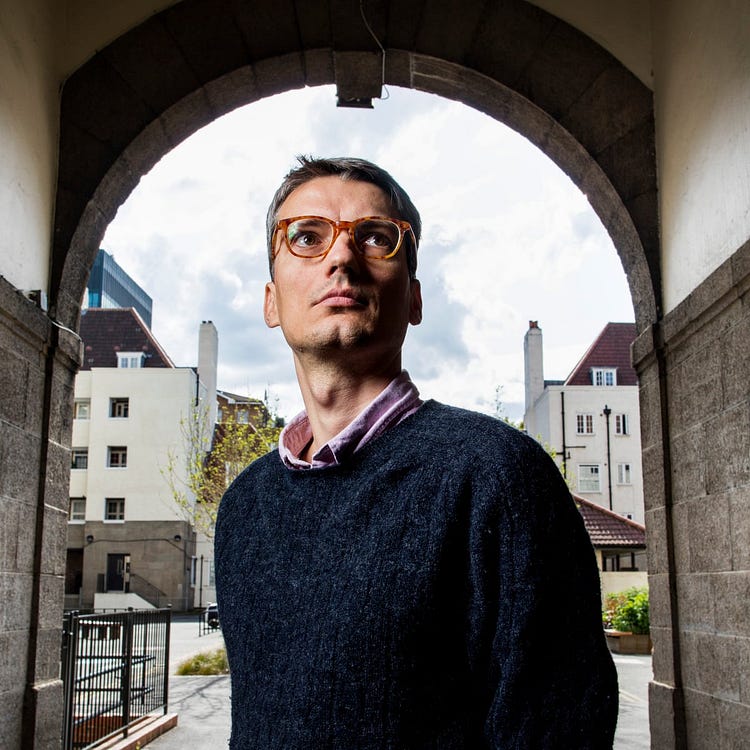
Schuringa is also explicit in his political analysis of analytic philosophy; as well as in his view that it was always — if only by default (or “unwittingly”) — political anyway (as already mentioned). He writes:
“[T]he ‘apolitical’ are, just by virtue of sealing themselves off from political engagement, particularly susceptible to unwittingly falling into line with the prevailing ideology and its structures.”
This is a classic expression of an endlessly-repeated Marxist trope. Here goes:
If one is apolitical, then one is political.
Or:
If one is anti-political, then one is political.
Pointing this out will lead many people on the Radical Left to question my “naïve” and “unsophisticated” bifurcation of philosophy and politics (Schuringa will certainly do so) — and that in itself will be a political position. This was the traditional Marxist response to all people who put the view that there are at least some domains that simply aren’t political — at least not in any clear or non-questioning-begging sense.
This complete denial — or rejection — of any separation of philosophy (or anything else for that matter) from politics has, of course, become de rigueur and hugely widespread in various domains in the last 30 years or longer — especially in many British and American university departments. Indeed the embracing of the idea that “everything is political” has given activists like Schuringa the perfect excuse to make everything political. That means that there’s nothing to hold such academics back once they embrace the essentially Marxist catechism that everything is political… even a lump of dogshit or the “idea of a quark”.
Yet this back and forth between stating that analytic philosophy isn’t political (or isn’t political enough) and saying that it was always political anyway leads Schuringa to state the following:
In order for analytic philosophy to “develop and grow”, it most become political in only radical ways.
… ways which just happen to perfectly square with Schuringa’s own personal politics.
Schuringa is explicit about his political demands when he writes the following words:
“It will not be enough to regiment some of the ideas in, say, critical race theory, extracted from another literature using its own procedures and on its own terms, into its own format.”
In other words, an analytic-philosophy version of Critical Race Theory (if such a thing could ever exist) simply wouldn’t be enough for Schuringa. He demands a literal Critical Race Theory (i.e., from analytic philosophers) which hasn’t been (politically) watered down with the tools, methods and standards of analytic philosophy. That is, he wants an analytic philosophy that has
“open[ed] itself to immersion in cultural, social and political reality”.
… But only an immersion that perfectly squares with the theories, values and goals of Schuringa’s personal politics.
All this is Schuringa’s roundabout — and academic — way of saying that analytic philosophy must become a weapon of social and political change. That is, it must actually stop being analytic philosophy and become something entirely different. More specifically, analytic philosophers must become exactly like those legions of Critical Race Theorists, Marxists, post-structuralist philosophers, postmodernist philosophers, etc. who basically believe — and have believed for the last six decades or so — that politics must always be First Philosophy.
So Schuringa’s political plan isn’t simply about making analytic philosophy more politically (or socially) aware. It’s about making analytic philosophy more aware of the political theories, causes and goals that Schuringa himself has thoroughly embraced — both in his academic work and in his non-academic activities.
For example, Schuringa writes:
“[Analytic philosophy] has heard the call of feminism, of critical race theory, and of the movement to decolonize the curriculum, and it is actively in the business of trying to heed these calls.”
As with Schuringa’s remarks on Critical Race Theory above: it’s simply not enough to “hear[] the call” of feminism, Critical Race Theory and the movement to decolonize the curriculum: analytic philosophy must become as one with all of them.
Schuringa even tells us about what analytic philosophy may become once it has completely embraced and faithfully enacted every letter of his political plan (then politically redeemed itself). He writes these pompous words:
“[Analytic Philosophy] will then have the prospect of being, for the first time, truly alive.”
So “truly alive” simply means being truly and correctly political.
Actually, it’s even more concrete than that: “truly alive” simply means being truly political in ways which Schuringa agrees with.
So the politicisation of analytic philosophy is not only what Schuringa demands. He also demands the politicisation of analytic philosophy in only his ideologically-correct ways. Hence Schuringa’s very specific and very positive references to Critical Race Theory, “the decolonisation of the curriculum”, etc.
[A quick aside: All this is very odd from a personal — social media — point of view too. In terms exclusively of Twitter: almost — or even literally — every analytic philosopher I “follow” and know is on the Left — from the Radical Left to the “centrist” or “liberal” Left. (There is a very-very small number of analytic academics who may well be Liberal Democrats — but they also lean to the Left. Not a single one is a Tory or right-wing in any sense — though more-Left-than-thou activists may disagree about that.) What’s more, many of these analytic philosophers on Twitter openly and explicitly express their leftwing views and do so very often. Indeed a small number of them could even be classed as political activists… All that said, Schuringa would — or could — simply argue that although these philosophers are indeed on the Left, what they do — i.e., analytic philosophy — most certainly isn’t!]
The Politically Suspect Identity of Analytic Philosophy
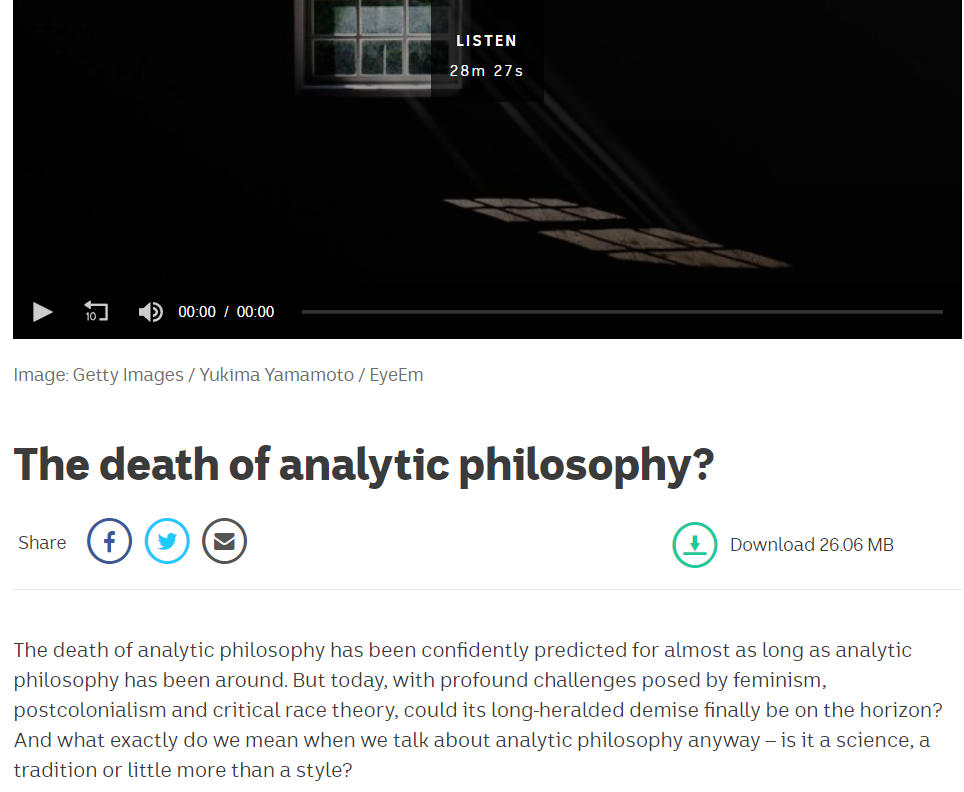
Schuringa then psychoanalyses analytic philosophers. He tells us that
“[i]t might be thought that analytic philosophers have experienced a healthy (and mild) identity crisis”
in that they might — or should — have
“come to see that they have much in common with other approaches, so are less inclined to insist on their own identity”.
Yet, on the whole, Schuringa believes that most (or all) analytic philosophers certainly haven’t done this.
Schuringa has a problem with the “identity” of analytic philosophy… Basically, that it so much as has one.
Take the following words:
“An object lesson in the tendency of analytic philosophy to mark itself out as distinctive from the rest of philosophy is the divide that it created between itself and what it called ‘continental philosophy’.”
Yet it seems that Schuringa doesn’t have a problem with Critical Race Theory, feminism, etc. having their own identities. I suspect that he doesn’t have a problem with university departments specialising in Marxism, post-structuralism, Black Studies, etc. having identities either. Indeed I also suspect that he’s also very much in favour of “identity politics” too (though, of course, he’ll reject that term).
Schuringa says more about the identity of analytic philosophy. He wonders if
“there was ever a unified kind of philosophy called analytic philosophy”.
A philosopher may have a commitment to analytic philosophy without thinking too much about it. (Schuringa seems to argue that analytic philosophers both are and are not self-conscious about what they do.) After all, since a fair few non-analytic philosophers are keen to stress analytic philosophers’ complete ignorance of the history of philosophy (which Schuringa himself is attempting to rectify in his article), then this degree of historical self-consciousness among analytic philosophers won’t exist to any strong degree.
If we get back to his Schuringa and the identity of analytic philosophy.
Now every university faculty on the planet has its own focus and specialisms — such as Black Studies or much of what’s studied at the University of London School of Oriental and African Studies. Yet, according to Schuringa, this rejection of continental philosophy, Critical Race Theory, etc. is deeply suspect. So should the UK and US departments which concentrate on, say, Subaltern Studies also be more inclusive — should they also run a few courses on Hayekian economics or modal logic? Or, more relevantly, should philosophy departments which concentrate on what’s called Continental Philosophy broaden their own horizons by allowing in professors who are experts on the analytic philosopher Ted Sider, the (analytic) philosophy of science or the (analytic) philosophy of mind?
Moreover, there are countless university departments which offer “studies” which advance the political causes Schuringa believes in. Indeed some of them can even be vaguely construed as doing various kinds of (politically-committed) philosophy. Now is analytic philosophy really a rival — let alone any kind of political threat — to all the following? -
Black Studies, Social & Cultural Analysis, Post-Colonial Studies, Subaltern Studies, Deconstruction, Critical Race Theory, Global Liberal Studies, Ethnic Studies, Africana Studies, Cultural Studies, Gender and Sexuality Studies, Literary Theory, Peace and Conflict Studies, Feminist Geography, Discourse Analysis, Africana Studies, etc.
To add to the above it’s worth mentioning the fact that there was even a Centre for Contemporary Cultural Studies at Birmingham University which explicitly committed itself to what it called “cultural Marxism”. (Now that non-Marxists have caught onto the term “cultural Marxism”, Marxists rarely use it anymore - see here.) And there’s the New School for Social Research in New York which is devoted to teaching what it calls “progressive values”. (This “school” wouldn’t even allow a young student in if he/she had the wrong politics — not that such a person would attempt to gain entry in the first place.) There are many other educational institutions like this — a small number are on the Right too. Yet all these institutions are far more politically biased — indeed openly and blatantly so! — than any analytic philosophy department has ever been. That said, Schuringa actually endorses such political bias — or “political commitment” — in such institutions (if only bias of certain political kind).
In fact the studies (or the academics who teach and advance them) mentioned above rule the roost in many American university departments and even in the entire universities themselves.
More generally, it must also be said that literally all disciplines are isolated from other disciplines… to some degree. This is true of literary theory, poststructuralism, Critical Race Theory, history, anthropology, etc. It’s certainly true of physics, chemistry, etc. In fact it can be argued that that’s partly what makes a discipline a discipline — a degree of isolation from other disciplines. That said, almost every analytic philosopher I know — both throughout the 20th century and today — did have a keen interest in other disciplines such as physics, biology, ethics, neuroscience, mathematics, etc. And, more recently, in cognitive science.
It’s also worth adding here that it’s not just that Schuringa wants analytic philosophy to fully embrace Critical Race Theory, continental philosophy, etc., he also believes that it should embrace non-European thought too.
So once wonders what would be left of analytic philosophy after Schuringa’s political and academic Year Zero.
The following is Schuringa on the particular subject of non-Western thought:
“Philosophy as a discipline has a huge whiteness problem, and it is right that the hegemony of Western philosophy in the academy must be addressed if the curriculum is to be effectively decolonized.”
In this, Schuringa is adopting a similar position to Professor Bryan Van Norden. Indeed Van Norden once wrote an essay called ‘Western Philosophy is racist. In that essay he wrote the following:
“Mainstream philosophy in the so-called West is narrow-minded, unimaginative, and even xenophobic.”
Again, what would be left of analytic philosophy — or even “Western philosophy” — if these academic activists got their way?
Like Schuringa himself, Professor Van Norden’s case against Western philosophy is almost entirely political. Indeed he lays his own political cards on the table when he calls his position “a multicultural manifesto”. And whereas Schuringa suggests Critical Race Theory, etc. as an antidote to the political sins of analytic philosophy, Van Norden wants analytic philosophers to study
“African-American, Christian, feminist, Islamic, Jewish, Latin American, and LGBTQ philosophies”.
Conclusion: Analytic Philosophy is Capitalist
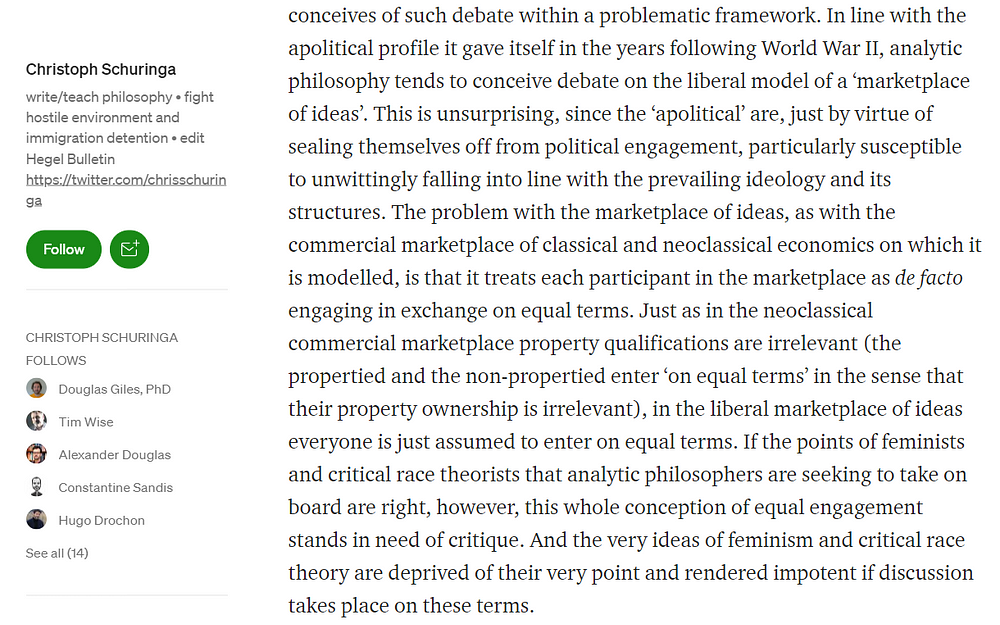
Schuringa does acknowledge that there has been at least some change when it comes to analytic philosophy … just nowhere near enough to please him. He writes:
“And so what we are left with is a more modest kind of analytic philosophy — a modesty perhaps reflected in a less strident opposition to alternative approaches to philosophy among analytic philosophers today.”
The assumption here is that if analytic philosophy becomes political (despite it already being apolitically political), then it must become political in very particular ways. And if it does become “more sensitive to the other”, then it must be more sensitive to the very particular others Schuringa himself has in mind.
Schuringa can’t even resist some explicit and classic Marxist politicking when he states the following:
“[A]nalytic philosophy tends to conceive debate on the liberal model of a ‘marketplace of ideas’…… The problem with the marketplace of ideas, as with the commercial marketplace of classical and neoclassical economics on which it is modelled, is that it treats each participant in the marketplace as de facto engaging in exchange on equal terms.”
[Schuringa argues against what he calls “liberal democracy” — as well as against capitalism, the “founding fathers”, etc. — here. See screenshot left.]
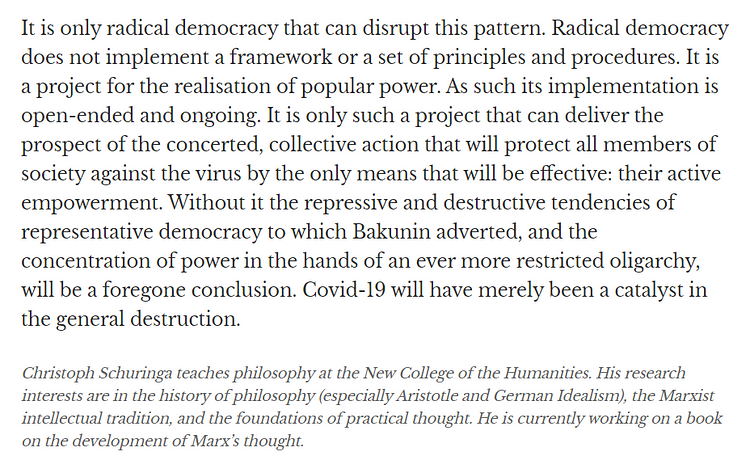
So this isn’t really about philosophy or even about Richard Rorty’s analytic “style”. It’s not about the critical emphasis on logic, “scientism” and all the other sins of analytic philosophy either. It’s really about
“this whole conception of equal engagement stands in need of critique”.
And that’s why there’s hardly a word on what analytic philosophers have argued or believed in Schuringa’s article except from a self-consciously historical point of view — all designed to show how variable analytic philosophy has actually been. (Doesn't that fact actually work against much of what Schuringa says?) In other words, there’s virtually no philosophy in the article; though there is lots of history of (analytic) philosophy. Yet that historical research itself is only a tool to advance Schuringa’s central political aims.
Schuringa’s sees everything through a political lens.
He simply doesn’t do philosophy or engage with analytic philosophy at all. And that primarily because all (non-political) philosophy — as Marx argued 170 years ago — is by definition suspect or fallen. Thus analytic philosophy itself must redeem itself by committing itself to a very specific kind of politics — radical politics.
So unless analytic philosophy gets its act together and becomes politically activist (in the ideologically-correct manner, of course), then it will remain the case that
“the very ideas of feminism and critical race theory are deprived of their very point and rendered impotent if discussion takes place on these terms”.
This is like the Marxist idea that literally all criticisms of Marxism are the result of “false consciousness” or of being a member of the enemy class. Yet once you make the absolute and complete leap of faith into Marxism, then you will see that Marxism is the Truth and that all one’s previous criticisms were result of “class bias”, “brainwashing by the mainstream media”, political sin or whatnot.
Similarly with Schuringa’s Critical Race Theory, etc.
Analytic philosophers mustn’t — or can’t — simply take on board Critical Race Theory or even embrace many aspects of it. Instead, they must fully embrace it in thoroughly activist sense. (In the sense that Schuringa himself uses philosophy as a political weapon.) Because if analytic philosophers don’t do what Schuringa demands, then (among other things) “the very ideas of feminism and critical race theory are deprived of their very point and rendered impotent”.
So analytic philosophy must simply stop being analytic philosophy.
It must become a philosophy of political activism.
Indeed it must commit itself to very specific political theories, causes and goals and also to very specific political movements — all those which just happen to be endorsed by Schuringa himself.
One may ask, then, what would be left of analytic philosophy were Schuringa’s many absolutist and all-encompassing political demands ever met.
Nothing would be left.
Quite literally — nothing.










No comments:
Post a Comment